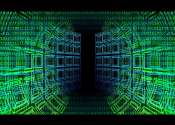New algorithms advance the computing power of early-stage quantum computers
A group of scientists at the U.S. Department of Energy's Ames Laboratory has developed computational quantum algorithms that are capable of efficient and highly accurate simulations of static and dynamic properties of quantum ...
Nov 10, 2021
0
283









